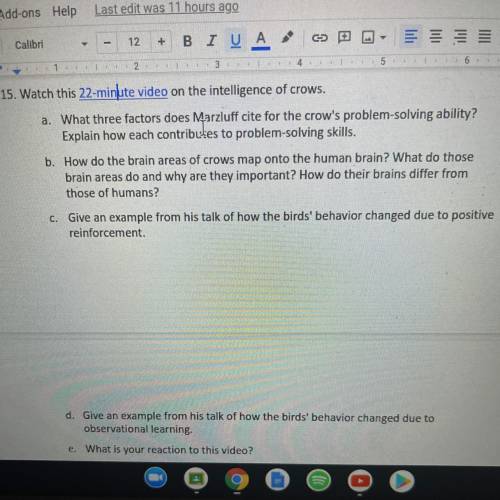
Answers: 3


Other questions on the subject: English

English, 21.06.2019 18:30, sethlynn2003
Her brother joined the army before he finished college. identify the adverb clause in the sentence. a) finished college b) her brother joined c) brother joined the army d) before he finished college
Answers: 1

English, 21.06.2019 20:10, Gabilop
Memories of a memory have you ever witnessed something amazing, shocking or surprising and found when describing the event that your story seems to change the more you tell it? have you ever experienced a time when you couldn't really describe something you saw in a way that others could understand? if so, you may understand why some experts think eyewitness testimony is unreliable as evidence in scientific inquiries and trials. new insights into human memory suggest human memories are really a mixture of many non-factual things. first, memory is vague. imagine your room at home or a classroom you see every day. most likely, you could describe the room very generally. you could name the color of the walls, the floors, the decorations. but the image you describe will never be as specific or detailed as if you were looking at the actual room. memory tends to save a blurry image of what we have seen rather than specific details. so when a witness tries to identify someone, her brain may recall that the person was tall, but not be able to say how tall when faced with several tall people. there are lots of different kinds of "tall." second, memory uses general knowledge to fill in gaps. our brains reconstruct events and scenes when we remember something. to do this, our brains use other memories and other stories when there are gaps. for example, one day at a library you go to quite frequently, you witness an argument between a library patron and one of the librarians. later, when telling a friend about the event, your brain may remember a familiar librarian behind the desk rather than the actual participant simply because it is recreating a familiar scene. in effect, your brain is combining memories to you tell the story. third, your memory changes over time. it also changes the more you retell the story. documented cases have shown eyewitnesses adding detail to testimony that could not have been known at the time of the event. research has also shown that the more a witness's account is told, the less accurate it is. you may have noticed this yourself. the next time you are retelling a story, notice what you add, or what your brain wants to add, to the account. you may also notice that you drop certain details from previous tellings of the story. with individual memories all jumbled up with each other, it is hard to believe we ever know anything to be true. did you really break your mother's favorite vase when you were three? was that really your father throwing rocks into the river with you when you were seven? the human brain may be quite remarkable indeed. when it comes to memory, however, we may want to start carrying video cameras if we want to record the true picture. part a and part b below contain one fill-in-the-blank to be used for all three question responses. your complete response must be in the format a, b, c including the letter choice, commas, and a space after the commas. part a: which of the following best explains why memories from childhood are unreliable? fill in blank 1 using a, b, or c. our brains add details and general knowledge to childhood memories. our brains are not as reliable as video cameras are. our brains create new stories to make the past more interesting. part b select one quotation from the text that supports your answer to part a. add your selection to blank 1 using e, f, or g. but the image you describe will never be as specific or detailed as if you were looking at the actual room. when a witness tries to identify someone, her brain may recall that the person was tall, but not be able to say how tall. to do this, our brains use other memories and other stories when there are gaps. select one quotation from the text that supports your answer to part a. add your selection to blank 1 using h, i, or j. documented cases have shown eyewitnesses adding detail to testimony that could not have been known at the time of the event. with individual memories all jumbled up with each other, it is hard to believe we ever know anything to be true. when it comes to memory, however, we may want to start carrying video cameras if we want to record the true picture answer for blank 1:
Answers: 2

English, 22.06.2019 05:00, kiarakagni
Excerpt from the prophet kahlil gibran and think not you can direct the course of love, for love, if it finds you worthy, directs your course. in this line from the passage, what does the word course mean? a) a mode of action or behavior b) a part of a meal served as a unit c) a designated area of land or water d) a continuous layer of building material
Answers: 1

English, 22.06.2019 06:10, ladnerhailey16
What is significant about the language in this excerpt from our town? select all that apply. it lacks specificity. it creates an enthusiastic tone. it makes weddings seem dull and uninspiring. it encourages the audience to make inferences about weddings.
Answers: 1
You know the right answer?
Can you guys help me with this question?
...
...
Questions in other subjects:

History, 02.03.2021 21:10

Mathematics, 02.03.2021 21:10



Mathematics, 02.03.2021 21:10

Mathematics, 02.03.2021 21:10

Mathematics, 02.03.2021 21:10



English, 02.03.2021 21:10




